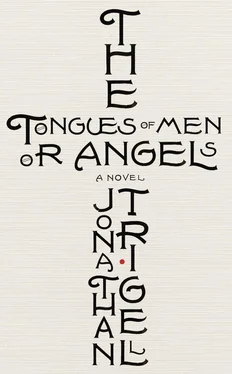So, on the sixth day, Pontius had the assembled multitude all summoned to the stadium, as if he was going to answer them. But then, upon his signal, they were encircled by soldiers, three ranks deep, with swords already drawn, and ordered to desist protesting.
Whereupon the fucking Israelites only all flung themselves on the ground, extended their necks, and cried that they would rather die than transgress the Torah. Bloody hundreds, if not thousands of them, baring their napes so their heads could be cut off. What can you do with a people like that? Pontius could hardly massacre them all in cold blood, having only just arrived. The Emperor Tiberius might even have rescinded his appointment. So Pontius had to let them have their way in the end and take the standards down. Bloody incorrigible people.

Pontius and his entourage descend to the walled courtyard adjoining the palace, where Kayafa and several squads of Temple Guards stand before the dawn. The prisoner himself is framed by the rising sun; it glows around him, making his white robe look orange.
Four slaves place the prefect’s judgement seat on the paving. A skinny lizard — morning-slow — skips away from it into a crack.
Pontius sits and folds the two sides of his cloak across his bare legs. A large tan and white Mollossian mastiff ambles down the steps after the rest of the party and settles at his side. The toes of its paws are longer than a child’s fingers. Pontius smooths the shaggy mane around the loose-hanging fighting flesh of its neck.
‘You will forgive me for not entering your palace I hope, Prefect?’ Kayafa says, to break the silence. ‘We have the festival, as you know, and I have to be pure for it.’
‘Of course, of course, I understand, Kayafa. I have been having your laws and prophets read to me each night by one of my slaves. Do you know, I think I must be as well versed as most Judaeans by now? If you were somehow to incur uncleanness you would have to be purified again. A ritual that consists of … Remind me.’
‘The impure man must descend naked into the water of the mikveh and emerge again from the other side.’
‘So, like a bath?’
‘A bath, Prefect, correct.’
‘A bath, that’s right. And such baths are near impossible to find?’
‘The prefect knows that there are many mikveh in the Temple surrounds, but these would be exceedingly busy at festival time. They must be entered one at a time and the queues would be lengthy.’
‘Have you ever thought of having one installed in your own villa?’ Pontius asks. ‘I would have thought that could offer considerable advantages.’
‘I believe the prefect is aware that I do have one in my villa.’
‘Well, now, that sounds more convenient. And yet you still prefer to drag me outside my palace rather than use it?’
The high priest begins to say something but Pontius waves him to be silent. ‘Let’s just get to the business, shall we? So, this is the prisoner. Behold the man for whom I have to rise before dawn. His name again?’
The prisoner is many-named, Pontius is informed, as many people are, common and great. His given name, Kayafa says, is Yahushua bar Joseph. But apparently most people call him Yeshua. Yeshua of Nazareth; Yeshua the Nazarene; Yeshua the Rabban; Yeshua bar Joseph; Yeshua the Messiah; the rabble know him best as Yeshua bar Abba, perhaps from his habit of asking followers to call God ‘Abba’ — Father — in the special prayer he teaches. The words of people who know God personally, who speak with Him directly; an over-familiarity, in the view of Kayafa. Though possibly the prisoner is called bar Abba because Son of the LORD God is a royal title and he claims to have been anointed and adopted as king.
‘Presumably he’s not a Roman citizen?’ Pontius asks. It’s ridiculously unlikely, but best to check these things since Romans have the right of appeal to Caesar’s court.
‘No. He’s not even strictly a Judaean. A landless Galilean. He was at first a follower of the Baptizer John.’
Pontius was told about the Baptizer: executed for preaching dissent and for criticizing Herod Antipater’s incestuous marriage. Some stories blamed the bride’s daughter, painted her as a stunning little cunny — Pontius wouldn’t have minded meeting that one. It’s probably all a lie, though: these people are always blaming women for their sins … They say Baptizer John’s head was put on a plate when it was severed and a banquet held before it. They say it rolled around in the last of the blood, John’s long curls coated, then congealed in it. They say they had to put a cloth over it to stop the flies swarming on it. But still it drew them and eventually they moved it away from the food to the opposite end of the banquet hall. Wonder what happened to it afterwards? Probably no one knows. The bodies of the executed are given no ceremony. They are dumped in ditches and ravines or buried in hasty holes. They are never returned to their family: that is part of the punishment.
Thoughts of banqueting make Pontius hungry. But he is running a little towards fat these days, it must be said. So he resists the urge to call for food. He calls for wine instead. Anyway, best to keep the liquids up for the heat, which will certainly arrive later in the day, and the local water tastes to Pontius like it was bucket-bailed out of Charon’s leaking vessel of the dead. It is tainted, half cut with decaying flesh. And not surprising, when the hills all about Jerusalem are covered with tombs. The water flowing to the pool of Siloam must have percolated through every shrouded skeleton and rotted funeral winding and sack of part-decomposed flesh lumps of all the deceased of the land.
But you try to put up an aqueduct to get in fresh water direct to the city. You try to do that to help them and leave Jerusalem a better place than you found it and you have more riots on your hands. It is un-bloody-believable.

Quite recently, this was: Jerusalem needed more clean water and the Temple Treasury was sitting on huge piles of gold. Sacred money, yes, but Pontius had the high priest’s permission — albeit under some duress — and Jewish law permitted the use of the fund for social welfare and public works. Now, what is an aqueduct if not public works? And welfare at the same time, for that matter: not dying, squirting out your own innards of bloody dysentery, is bloody welfare, isn’t it?
You would have thought they would be grateful; but instead, at the next festival, Pontius had found a palace surrounded once more. By several thousands this time. They probably thought they’d repeat the offer-their-necks thing, which had worked over the standards, if he sent in the troops. But Pontius wasn’t about to be tricked like that again.
This time he had auxiliary soldiers — Samaritans, who look pretty much identical to Jews — dress up in civilian clothing and mingle with the protesters. And when the rabble refused to withdraw, the troops broke it up by force.
Pontius had forbidden them to use swords, permitting only quarter staffs and clubs, perhaps a few daggers, just to rough the crowd up and scare them a bit. But, of course, the soldiers had got carried away once the blood mist set in, as Pontius had half known they would. It’s about as optimistic as commanding a war dog to savage someone gently, to think that Samaritans would use restraint against Judaeans, the enmity between them being age-long and bitter. Any protesters who resisted were stabbed or beaten to death on the street and probably even more were trampled or crushed while trying to flee. Several hundred were dead by the finish, but it didn’t much matter because the result was good: order was restored.
Читать дальше













